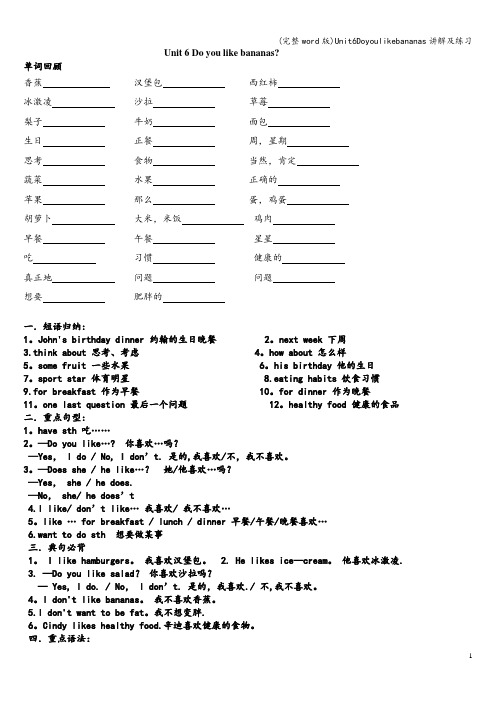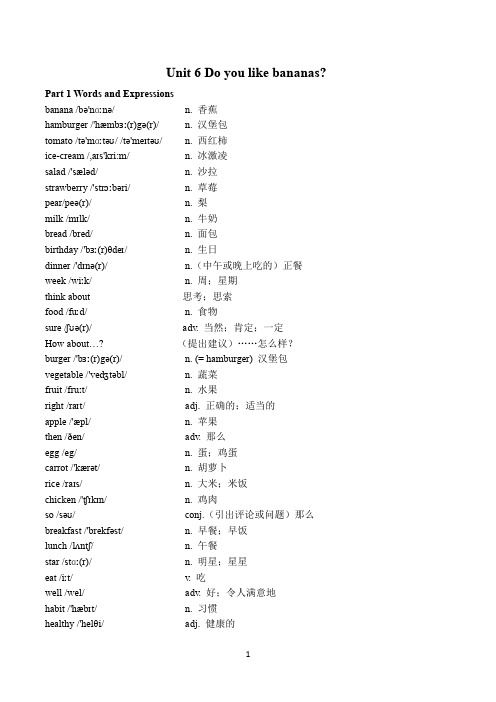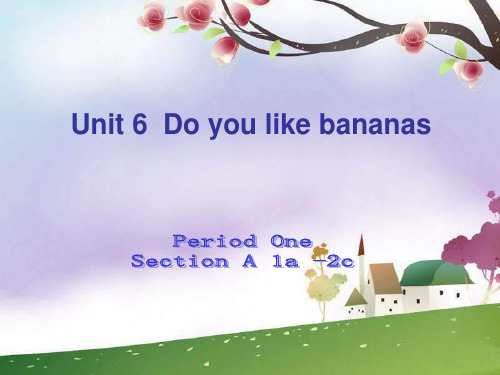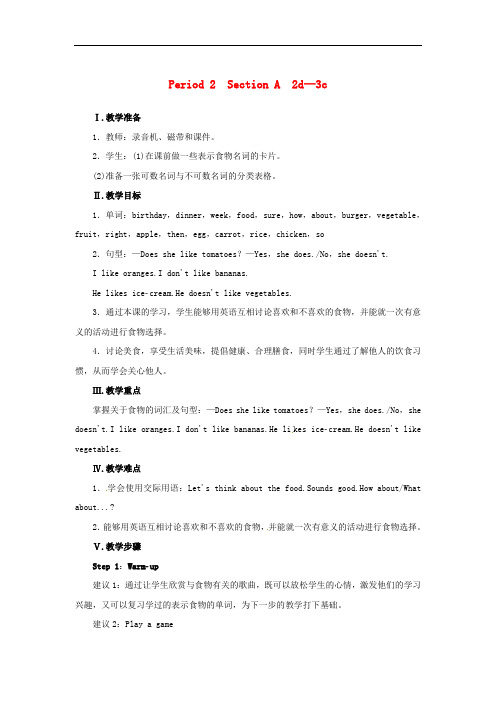Unit 6 Do You Like Bananas period2
【自用】七年级英语 Unit6 Do you like bananas Period 2 说课稿

Unit6 Do you like bananas?Period 2说课稿我说课的内容是人教版英语七年级上册Unit 6 Do you like bananas? 第二课时,我将从以下几方面展开我的说课:一、说教材本单元以食物为话题贴近学生的生活实际,围绕着谈论喜欢与不喜欢的食物以及一日三餐等语言功能展开一系列任务活动,学生比较感兴趣。
本节课主要学习动词like一般现在时的肯定句和否定句及有关食物的可数名词与不可数名词。
二、说学情七年级的学生已具备了一定的英语学习基础,他们活泼好动、好奇心强、喜欢游戏、竞赛等,但对于谈论生日派对进行分角色表演有一定难度,需要教师从学生的活动入手,注重学习的趣味性。
三、说学习目标1.掌握重点单词food, fruit, vegetable等;2.学会使用动词like询问对方喜欢与不喜欢的食物,掌握动词like的一般现在时的肯定句和否定句的用法,3.通过学习培养学生表达自己的喜好,树立良好的饮食习惯和健康的饮食观。
学习重点:1.掌握重点单词及他们的分类规则;2.掌握动词like的一般现在时的肯定句和否定句的用法。
学习难点:引导学生进行分角色表演对话,达到学以致用的目的。
四、根据学情说教法、学法在三师“创设开放式教学情境,构建体验性教学模式”的理念下,采用我校的“情境互动”教学模式,充分发挥专业教室的功能,以趣味活动为主线,以体验感悟、交流提升为中心,采用情景教学法、任务型教学法等引导学生在轻松愉快的氛围中快乐的学习。
学习方法:小组合作法、交流展示法五、说教具学具:专业教室展板、多媒体课件、词汇卡片、录音机等。
六、说教学流程一、歌谣激趣---导入课题(约2分钟)师自我介绍,创设情境,引出birthday dinner,师生共同演唱歌谣,问:Do you like bananas?由此引入课题并板书。
设计意图:激发学生的学习兴趣,在师生互动中,消除师生之间的陌生感,让学生在快乐中启迪思维,感受学习语言的快乐。
人教七年级英语上册unit 6 Do you like bananas (Period2) 课件

Period2 2d—3c
不可数名词 1.定义:是指不能计数的名词。 2.不可数名词前不可以用a , an限定。 3.不可数名词前不可以用one, two, three…
限定。 4.不可数名词没有复数形式。
既可数又不可数名词
可数名词与不hes, pants, trousers, jeans, glasses
形式上复数,做主语时谓语用单数形式:news, maths, physics
集合名词,一般用作复数概念:police, class, team, family, people
Uncountable nouns
/No, she doesn’t. A: Let’s…with her. B: That sounds good.
Do you like vegetables?
A: Do you like …? B: Yes, very much./Sorry, I don’t. A: Let’s have/eat…. B: That sounds good./That sounds boring.
I like oranges.
I don’t like bananas.
We like rice.
He likes icecream.
We don’t like hamburgers. He doesn’t like vegetables.
Grammar Focus
Countable nouns
Uncountable nouns
的
加-es
boxes watches
knives wives
可数名词复数形式的构成(2)
七年级人教版英语上册Unit6Doyoulikebananas?全单元教案

Unit 6Do you like bananas?Period 1(Section A 1a-1c)Teaching aims1. Learn words and be able to say, read and write them:orange(s), banana(s), strawberry, strawberries, pear(s), apple(s),tomato(es), carrot(s), vegetable(s), hamburger(s), egg(s), ice-cream(s),salad(s), bread, chicken2. Be able to talk about likes and dislikes by using:I/We/They like oranges. He/She likes oranges.I /We/They don’t likebananas. He/She doesn’t like hamburgers.Do you like salad? Yes, I do./No, I don’t.Does he/she like tomatoes? Yes, he/she does. / No, he/she doesn’t.3.Understand the difference between countable nouns and uncountable nouns.Teaching key and difficult points:1.Learn these words and be able to say, read and write them:2.Be able to talk about likes and dislikes by using:I/We/They like oranges. He/She likes oranges.I /We/They don’t likebananas. He/She doesn’t like hamburgers.Do you like salad? Yes, I do./No, I don’t.Does he/she like tomatoes? Yes, he/she does. / No, he/she doesn’t. Moral objects(1)To call students ’ attention to otherserests and’ei n ablet themto care more about classmates.(2)To improve Sts ’communicating skills and enable them to keeptheir health.教学设计备注Step 1. Warm-up and revision(1)Daily greeting to the students(2)Revision: What ’s this/that in English ? What coloris it?T:What ’s this in English? (show a picture of andorange)T:What color is it?Step 2. Presentation –New words.(1)Go on asking: What ’s this/that in English ? Whatcolor is it?T:What ’s this in English? (show a picture of anapple and if the student don’t know it, show thephonetic symbol of the word.)T: Spell it, please.S: A-P-P-L-E.T: What color is it?S: It ’s red.(Present the other three words as above: pear,strawberry, banana )T:We can call all of these things fruit . (Teach the newword “fruit ”.)Show pictures and ask the Ss “What arethese/those? ”and ask the SS to spell the pluralforms of these words: oranges, apples, pears,strawberries, bananas.(2)Repeat step (1) to present: carrot, carrots,tomato, tomatoes and vegetable, vegetables.(3)Present some more words by showing pictures. Get theSs to make an effort to pro nounce and spell the new words.Bread, hamburger ,hamburgers, milk, ice-cream,ice-creams, salad, chicken ,an egg, eggsWe can call all of these things food:食物3.Memory Challenge: Who has the best eyes?(1)Show the pictures, and say the plural forms of the nouns andsome uncountable noun.(2)Summarize. 可数名词有复数形式 , 不可数名词一般没有复数形式Step 3Presentation Target language 11. Show the pictures and say:I like tomatoes, but I don’ t like bread.2.Let students say:I like, but I don’t like ....3. Show the pictures and say:She likes bread, but she doesn’t like milk.He likes chicken, but he doesn’t like eggs.4.Let students say: He/She likes , but he/she doesn’tlike ....According Ss’answers and say:5. Sing a chant:Bananas, bananas, I like bananas! Salad, salad, I like salad!Strawberries, strawberries,I don ’t like strawberries!Pears, pears, he likes pears!Milk , milk, he likes milk!Tomatoes, tomatoes,He doesn ’t like tomatoes! Step 4 Work 1a .1. Read the words.2.T: Look at the pictures and fill in the chart .Fruit Food Vegetable3.Match the words with the things in the picture.4.Check the answers .Step 5 Present the new language 1 .1. T: Oh, we have lots of delicious fruits . I like apples best.Do you like apples ?S1 :Yes , I do. I like apples.S2: No, I don't . I like salad.T: Do you like salad ? S3: Yes , I do. I like salad./ No, I don't . I don’tlike salad.Step 6 Pairwork .1. T: Work in pairs .Ask and answer with your partners .(Before class the students have draw some pictures of the food )2. Get the Ss to ask and answer in pairs, using the sentences:’t.A: Do you like ?B: Yes, I do./ No, I don 3. When you ask andanswer, please fill in the chart. Name Like DislikeStep 7 Present the new language 2 .1.Show pictures and ask and answer questionsDoes she/he like ?Yes, she/he does. She/He likes/ No, she/he doesn ’t. She/He doesn ’tlike .Step 8 Pairwork .1. T: Work in pairs .Ask and answer with your partners .2.Get the Ss to ask and answer in pairs, using the sentences:Does she/he like ?Yes, she/he does. She/He likes/ No, she/he doesn ’t. She/He doesn ’tlike .3.According Ss’answers and ask “Do they like ? Yes, they do./ No, they don’t.”Step 9 Work on 1b.1.T: 1b. List en and number the conversations.2.Listen.3.Check the answers.4.Read after the tape.Step 10 work on 1c.1.First, practice the conversations in 1b.Then, make a survey and fill in the chart below.2. Report: I like milk and tomatoes, but I don’t like ice-cream. Mary likes oranges, but she doesn’liket milk orice-cream. Tom likes tomatoes and strawberries, but hedoesn ’ t like bread.Step 11 . HomeworkWrite down the report.Blackboard design:New Words Unit 6 Do you like bananas?Do you like?Yes , I do. I likeNo ,I don ’t. I don ’tlikeDoes she/he like ?Yes, she/he does. She/He likes/No, she/he doesn ’t. She/He doesn ’tlike.Period 2(Section A 2a-2d)Teaching aims:1. Words & expressionsBirthday, dinner, week, think about, food, sure, how/whatabout ? Burger, vegetable, fruit, apple, then2. Target languageI like strawberries, they’re delicious. Let’s have them.--Yes, I like them ,too./ No, I don’tlike them.I like salad, it ’s delicious. Do you like it?-- Yes, I do./No, I don’t but I likeice cream.Let ’ s have Let ’s think about the food.Ability goalsEnable students to talk about likes and dislikes.Learning ability goalsHelp students learn how to talk about likes and dislikes.2. Listening and speaking skills.Moral object:Learn to keep healthy.Teaching important / difficult pointsHow to talk about likes and dislikes with the target language.教学设计备注Step1 Warm up and revision.1.Everyday greeting.2.Review.Show the pictures and say the singularforms and the plural forms of the countable nouns.3.Show some pictures of the uncountable nouns.4.Summarize.(1).当可数名词复数再次出现时,用“They( 主语)或 them(宾语)”替代。
(完整word版)Unit6Doyoulikebananas讲解及练习

Unit 6 Do you like bananas?单词回顾香蕉汉堡包西红柿冰激凌沙拉草莓梨子牛奶面包生日正餐周,星期思考食物当然,肯定蔬菜水果正确的苹果那么蛋,鸡蛋胡萝卜大米,米饭鸡肉早餐午餐星星吃习惯健康的真正地问题问题想要肥胖的一.短语归纳:1。
John's birthday dinner 约翰的生日晚餐 2。
next week 下周3.think about 思考、考虑 4。
how about 怎么样5。
some fruit 一些水果 6。
his birthday 他的生日7。
sport star 体育明星 8.eating habits 饮食习惯9.for breakfast 作为早餐 10。
for dinner 作为晚餐11。
one last question 最后一个问题 12。
healthy food 健康的食品二.重点句型:1。
have sth 吃……2。
—Do you like…? 你喜欢…吗?—Yes, I do / No, I don’t. 是的,我喜欢/不,我不喜欢。
3。
—Does she / he like…?她/他喜欢…吗?—Yes, she / he does.—No, she/ he does’t4.I like/ don’t like…我喜欢/ 我不喜欢…5。
like … for breakfast / lunch / dinner 早餐/午餐/晚餐喜欢…6.want to do sth 想要做某事三.典句必背1。
I like hamburgers。
我喜欢汉堡包。
2. He likes ice—cream。
他喜欢冰激凌.3. —Do you like salad?你喜欢沙拉吗?— Yes, I do. / No, I don’t. 是的,我喜欢./ 不,我不喜欢。
4。
I don't like bananas。
我不喜欢香蕉。
5.I don't want to be fat。
人教版新目标版七年级英语上册 Unit 6 Do you like bananas 教案

Unit 6 Do you like bananasUnit 6 Do you like bananas? 教学设计⑥1.复习词汇:like 2.词汇:banana ,hamburger ,tomato ,broccoli ,French fries , orange ,ice cream ,salad ,strawberry ,breakfast ,lunch , dinner ,egg ,apple ,chicken ,fruit ,vegetable3.句型:Do you/they like salad? Yes ,I/they do ./No ,I /they don ’t .Does he/she like salad? Yes ,he/she does ./No ,he/she doesn ’t.I/They like oranges . I/They don ’t like oranges .He/She likes ice cream . He/She doesn ’t like bananas .语法重点:动词like 一般现在时的肯定句、否定句和一般疑问句的用法以及肯定与否定的回答。
Step Ⅱ Exercise 随堂练习设计(1)翻译填空1.你喜欢吃香蕉吗? _______ you __________ bananas?2.艾米丽的哥哥不喜欢吃草莓。
Emily’s brother ________ _______strawberries .3.凯特早餐吃鱼吗? ______ Kate like fish ________ breakfast?4.你晚饭常常吃什么? What _______ you usually have ______ _________?5.我叔叔常常吃冰淇淋作甜食。
My uncle usually ______ ice cream ______ dessert .(2) 用所给词的适当形式填空1. Bob (like) French fries.2. I want some ______(tomato) for dinner3. Would you like some ______(salad)?4. How ______(much) eggs do you have?5. You can see ________ (lot) of pictures in his room.(3) 任务型阅读:根据表格内容完成下面的短文NameJoy Smith AgeFifteenlike SportFoodColoryellowDislike Sport FoodColor red Joy is a boy. He is fifteen years old. His last name is __________. Hoy is his _________ name. He likes to play ___________. He doesn’t like to play __________.。
初一英语人教版Unit 6 Do you like bananas Period

Here are what John’s classmates eat every day.
1. hamburgers d
2. tomatoes
i
Here are what John’s classmates eat every day.
1. hamburgers d
1. hamburgers d
2. tomatoes
i
3. oranges
f
4. ice-cream h
5. salad
Here are what John’s classmates eat every day.
1. hamburgers d
2. tomatoes
i
3. oranges
f
4. ice-cream h
Unit 6 Do you like bananas? ( Period 1 )
年 级:七年级
学 科:英语(人教版)
第一课时:听说能力培养—询问并描述个人喜好
年 级:七年级 学 科:英语(人教版)
Learning Objectives
By the end of this class, you will be able to • spell the English names of common everyday food. • identify the speaker’s likes and dislikes. • express personal likes and dislikes.
8. pears j 9. milk
Here are what John’s classmates eat every day.
Unit 6 Do you like bananas课文原文及语法重点

Unit 6 Do you like bananas? Part 1 Words and Expressionsbanana /bə'nɑːnə/ n. 香蕉hamburger /'hæmbɜː(r)gə(r)/ n.汉堡包tomato /tə'mɑːtəʊ/ /tə'meɪtəʊ/ n. 西红柿ice-cream /,aɪs'kri:m/ n.冰激凌salad /'sæləd/ n. 沙拉strawberry /'strɔːbəri/ n.草莓pear/peə(r)/ n. 梨milk /mɪlk/ n.牛奶bread /bred/ n. 面包birthday /'bɜː(r)θdeɪ/ n.生日dinner /'dɪnə(r)/ n.(中午或晚上吃的)正餐week /wiːk/ n.周;星期think about 思考;思索food /fuːd/ n.食物sure /ʃʊə(r)/ adv.当然;肯定;一定How about…? (提出建议)……怎么样?burger /'bɜː(r)gə(r)/ n. (= hamburger) 汉堡包vegetable /'vedʒtəbl/ n. 蔬菜fruit /fruːt/ n.水果right /raɪt/ adj.正确的;适当的apple /'æpl/ n.苹果then /ðen/ adv.那么egg /eg/ n.蛋;鸡蛋carrot /'kærət/ n.胡萝卜rice /raɪs/ n. 大米;米饭chicken /'tʃɪkɪn/ n. 鸡肉so /səʊ/ conj.(引出评论或问题)那么breakfast /'brekfəst/ n.早餐;早饭lunch /lʌntʃ/ n. 午餐star /stɑː(r)/ n.明星;星星eat /iːt/ v.吃well /wel/ adv. 好;令人满意地habit /'hæbɪt/ n.习惯healthy /'helθi/ adj. 健康的really /'riːəli/ adv. 真正地question /'kwestʃən/ n.问题want /wɒnt/ v. 需要;想要be /biː/ v.变成fat /fæt/ adj. 肥的;肥胖的Part 2:Texts课文(一)Jack: Hey, John’s birthday dinner is next week. Let’s think about the food. Tom: Sure. How about burgers, vegetable salad, and some fruit?Bill: Sounds good. John likes hamburgers.Jack: Oh, I don’t like salad.Bill:But John likes salad, and it’s his birthday.Jack:Yes, you’re right. What about the fruit?Tom: I think John likes strawberries and apples.Jack:OK. Let’s have strawberries and apples then.Structure——谈论好恶1.Do you like salad? Yes, I do./No, I don’t.2.Do they like pears? Yes, they do./ No, they don’t.3.Does she like tomatoes? Yes, she does./ No, she doesn’t.4.I like oranges. I don’t like bananas.5.We like rice. We don’t like hamburgers.6.He likes ice-cream. He doesn’t like vegetables.重点句型:Underline the correct words in the brackets.在括号内正确的单词下画线。
Unit 6 Do you like bananas Period 2 2a 2d课件

2a Listen and circle the food you hear. 听录音,圈出所听到的食物。
hamburgers pears tomatoes
strawberries oranges ice-cream
salad
Next week.
4. Does John like hamburgers?
Yes, he does.
5. What does Jack dislike(不喜欢)?
Jack doesn’t like salad.
6. What fruit does John like?
John likes strawberries and apples.
let 的用法 like 的用法 思考;考虑 think about 听起来不错 sounds good 你是对的 you're right
Class practice (根据图片提示完成句子)
1. — _D_o_ you likest_r__a_w__b_e_r_r_i_es? — Yes , I do. I like _b_a_n__a_n_a_s, too.
1.John的生日晚宴在下周。
John's birthday dinner is next week .
2.让我们考虑(吃什么)食物吧。
Let's think about the food.
3.汉堡,蔬菜沙拉和一些水果怎么样?
How about burgers,vegetable salad, and some fruit?
bananas
2b Listen again and fill in the blanks
Unit6Doyoulikebananas展示课2

oranges
a banana
bananas
a strawberry strawberries
salad
ice cream
broccoli French fries chicken
tomatoes
hamburgers French fries
ice cream broccoli
salad
banana strawberry
No, he/she doesn’t.
1a Match the words
1. hamburgers d
2. tomatoes g
3. broccoli
a
4. French fries h
5. orange
e
6. ice cream f
7. salad
c
8. bananas b
9. strawberries i
Look at this title:
1. Do you like bananas? 你喜欢香蕉吗?
(1) Do you like…? 是一个一般疑问句, 它表示询问对方是否喜欢某物。句中 do的是助动词,没有意义。
a hamburger
hamburgers
a tomato
tomatoes
an orange
的加s
case
Oranges cases
以o结尾的的词加s或 zoo
es
tomato
不规则变化
man
child
zoos tomatoes
men children
ห้องสมุดไป่ตู้
Guessing game
what’s this? It’s… Do you like…?
人教版英语Unit6《Do you like bananas Period 2 Section A(1a-2c)》 - 副本 (2)

oranges
strawberries apples bananas
a carrot a tomato
vegetables
蔬菜的总称 Do you like …(s/es)? Yes, I do. No, I don’t.
carrots tomatoes
hamburgers
bread ice
hamburgers. • Do you like broccoli? Yes, I do./ No, I don’t. • Does he/she like broccoli? Yes, he/she
does./No, he/she doesn’t. • 3.Perceive the Countable nouns and
f j
1b Listen and number the conversations
Do you like salad? 2 No, I don’t
Do you like bananas? 1 Yes, I do.
3 Do you oranges? Yes, I do.
1c
Practice the conversations above with your partner. Then make you own conversations. (Ask three of your teammates if they like these things and fill in the chart with “yes” or “no”.)
Aims and language points:
• 2.Be able to talk about likes and dislikes by using:
初中英语教案 Unit 6 Do you like bananas Period 2Section A 2d-3c教案

Period 2 Section A 2d—3cⅠ.教学准备1.教师:录音机、磁带和课件。
2.学生:(1)在课前做一些表示食物名词的卡片。
(2)准备一张可数名词与不可数名词的分类表格。
Ⅱ.教学目标1.单词:birthday,dinner,week,food,sure,how,about,burger,vegetable,fruit,right,apple,then,egg,carrot,rice,chicken,so2.句型:—Does she like tomatoes?—Yes,she does./No,she doesn't.I like oranges.I don't like bananas.He likes icecream.He doesn't like vegetables.3.通过本课的学习,学生能够用英语互相讨论喜欢和不喜欢的食物,并能就一次有意义的活动进行食物选择。
4.讨论美食,享受生活美味,提倡健康、合理膳食,同时学生通过了解他人的饮食习惯,从而学会关心他人。
Ⅲ.教学重点掌握关于食物的词汇及句型:—Does she like tomatoes?—Yes,she does./No,she doesn't.I like oranges.I don't like bananas.He li kes icecream.He doesn't like vegetables.Ⅳ.教学难点1.学会使用交际用语:Let's think about the food.Sounds good.How about/What about...?2.能够用英语互相讨论喜欢和不喜欢的食物,并能就一次有意义的活动进行食物选择。
Ⅴ.教学步骤Step 1:Warmup建议1:通过让学生欣赏与食物有关的歌曲,既可以放松学生的心情,激发他们的学习兴趣,又可以复习学过的表示食物的单词,为下一步的教学打下基础。
七年级英语教学课件:Unit 6 Do you like bananas Section B2

chicken
hamburgers
2b Read the magazine article and circle the food words.
2c Write five sentences about Cindy's eating habits.
Cindy likes healthy food. 1. Cindy______________________ 2. She _________________________ 3. She_________________________ 4. Cindy doesn't__________________ 5. She doesn't_________________
I want some milk.
Peter wants me to play soccer with him.
I. 从方框中选择单词,并用其正确形式填空。 for, be, eat, have, tomato
1. He likes eggs and bananas _fo_r_ dinner. 2. Her _e_a_t_in__g_ habit is not good. 3. In the red bag, I see five _to_m__a_t_o_es_. 4. Mike _h_a_s_ three pencils and two pens. 5. Anna doesn’t want __to__b_e__ fat.
What do you like for breakfast, lunch and dinner?
2a Which food do you think is healthy? Check( )Yes, Maybe or No.
初中英语教案 Unit 6 Do you like bananas Period Two教案

Unit 6 Do you like bananas?Period Two课前准备教师:搜集关于食物的图片,制作表格(见教学步骤)。
学生:准备上一节课的调查表格,作好对话和调查的准备。
教学设计Step One: Review the drill.①Review the drill “Do you like…”?②The girl and the boy are talking about their likes and dislike.Let’s open yourbooks and listen. Try to finish 2a and 2b as quickly as you can.Ss:…Step Two: New drills.①Present the new drills “Does she/ he like…? Yes, she / he does./ No, she /he doesn’t”using the chart above.T:Kate, do you like tomatoes?S1:Yes, I do.T:Do you like ice cream?S1:No, I don’t.(The teacher points at Kate and asks the class.)T:Does Kate like tomatoes?Ss:Yes, she does.T:Does Kate like ice cream?Ss:No,she doesn’t.(The teacher goes on asking Kate using the chart.)T:Does your best friend Sue like tomatoes?S1:Yes, she does.(Kate looks at her chart in her hand.)T:Who is your best friend?(The teacher points at Jane.)S1:Sall y is.T:Does she like tomatoes?S1:Sally is.(The teacher points at Tony and Maria.)T:Do your best friends like tomatoes?S1:Yes, they do./No, they don’t.(The teacher asks two more students to answer his/ her questions according to the chart in their hands. Then the teacher writes down the drills “Does she/he like…?Do they like…?” on the blackboard.)T:Work in pairs and practice the drill “Does he/she…? Do they…?”according to the chart.(Then the teacher asks some pairs of the students to practice one by one.)②Prac tice the d rills.T:Let’s work in pairs .(Student A looks at Page 33.Student B looks at Page 83.Try to find out what Bob and Bill and don’t like.)Sa:Does Bill like French fries?Sb: … Does Bob like French fries?Sa: …Step Three: Task.T:Do you love your parents?S:Yes.T:Ho w do you show your love t o them?S1:I’ll do as they say.S2:I’ll buy something for them when their birthday is coming.S3:I’ll study better and better.S4:I’ll make a big meal for them.T:Oh, I think it’s a good idea. Now let’s try to know what they like and dislike. First take out yesterday’s homework,exchange the information in pairs.(The teacher have asked the students to have a survey last class.)Parents like dislikeMotherFatherT:Does your father like chicken?(Point to a student)S1: No, he doesn’t.T:Does your mother like eggs?S1:Yes, she does.T:Do they like bananas?S1: Yes, they do.T:Now work in groups and make a food survey.Parents like disl ikeJim’s fatherJim’s motherKate’s fatherKate’s motherS2:Jim’s father likes… He doesn’t like… Jim’s mother likes…very much. She doesn’t like…And they both don’t like…(Then ask more students to report.)Step Four:Summary.In this class, we’ve learnt the Simple Present Tense,including of the third person singular form as subject.Homework.Rewrite your conversation in the form of a passage.。
海南省八中七年级英语上册 Unit 6 Do you like bananas Period 2 S

Period 2 Section A (2a~3c)Teaching important points 【教学重点】1.Key words & phrases:birthday,dinner,week,food,sure,vegetable,fruit,right,apple,then,egg,carrot,rice,chicken,so2.Key sentences:Does she/he like tomatoes?Yes,she/he does.I like oranges.He likes ice-cream.We like rice.Teaching difficult points 【教学难点】Be able to tell countable nouns from uncountable nouns.Teaching aids 【教具】CAI,a tape player,picturesTeaching procedures and ways 【教学过程及方法】★Step Ⅰ Revision and lead-in 复习导入T:What day is it today?Ss:Today is Friday.T:Yes,today is Friday.And today is also a special day.Can you guess?Ss:Today is your birthday.T:No,today is not my birthday but it is my friend Sally's birthday.Do you like birthday party?Ss:Yes.T:Yes,I love birthday party too,today let's learn something about how to prepare for a birthday party.★Step Ⅱ Self-studying and guiding 自学指导Self-study 1:Self-study the new words:birthday,dinner,week,food,sure,vegetable,fruit,right,apple,then,egg,carrot,rice,chicken,so.Learn to pronounce them according to the phonetic symbols.You can listen to the tapes to help you pronounce them correctly or ask others for help.Self-study 2:Read the conversation in Part 2d and circle the hard points and underline the important sentences.Self-study 3:Finish the exercises in 3a.Questions for thinking:(1)Classify the words in the box into countable,uncountable,and countable and uncountable nouns.banana,hamburger,tomato,ice-cream,salad,strawberry,pear,milk,bread,vegetable,apple,egg,carrot,rice,chicken,food,fruitCountable nouns:banana,hamburger,tomato,strawberry,pear,apple,egg,carrot,vegetableUncountable nouns:milk,bread,riceCountable and uncountable nouns:ice-cream,salad,chicken,food,fruit(2)Correct the mistakes in the following sentences.I have a milk.________________________________________________________________________ The tomatos are on the table.________________________________________________________________________ He like vegetables._____________________________________________________________________ ___Does he likes bananas?________________________________________________________________________ The teacher walks around the classroom to watch and help the students study while the students are self-studying.Encourage students to find out their problems in self-studying both in pronunciation and understanding.Time for questions:Discuss the difficulties that most students have and explain the language points that most students can't understand.★Step Ⅲ Check up检查核对Check up 1:Words teaching:Ask a few students to read the new words and help them correct the mistakes in pronunciation if necessary.Check up 2:Check the answers to exercises in Part 3a and above.Check up 3:Ask a few students to translate the following sentences to see if they can use the words do/don't,does/doesn't,like/likes correctly.1.你喜欢沙拉吗?是的,我喜欢。
[推荐学习]七年级英语上册 Unit 6 Do you like bananas Period 2教
![[推荐学习]七年级英语上册 Unit 6 Do you like bananas Period 2教](https://img.taocdn.com/s3/m/375f86aa8762caaedc33d406.png)
The third signal form
Ability Objects
Enable students to listen to and talk about what they
like and don't like
The students present the dialoguefreely.
Theteachers asksone or two students and then writethe sentences on theblackboard,s tudents do according to the form again and again.
Teaching Aims and Demands
Knowledge Objects
Words andPhrases:
Birthday food vegetable dinner fruit right then
Sentences:
Do you /they like...? Does he / she like...?
The teacher give out thesentences and make students work in groups find something.
Theteacher helpsstudents find the secret of the sentences.
Blackboard Design
Let students work in groups: and find something common in the sen tences.
- 1、下载文档前请自行甄别文档内容的完整性,平台不提供额外的编辑、内容补充、找答案等附加服务。
- 2、"仅部分预览"的文档,不可在线预览部分如存在完整性等问题,可反馈申请退款(可完整预览的文档不适用该条件!)。
- 3、如文档侵犯您的权益,请联系客服反馈,我们会尽快为您处理(人工客服工作时间:9:00-18:30)。
strawberry
strawberries
[iz]
dictionary
dictionaries
[iz]
Do you know the plurals(复数形式) 2 of these words?
+s
+ es
y i + es
hamburgers carrots bananas hats tables eggs photos apples pears radios keys vegetables pencils volleyballs
H om e w or k
1、
将Section A 2d部分对话抄写一遍, 翻译一遍
将课本第34页 self check 部分第 1题,做在作业本上
独立自主完成,不得抄袭; 注意句首大写、标点符号等细节; 按时完成并上交
2、
要求
The end
finish the 1a
Task 2 Listening(1b)
• A: Do you like bananas? • B: Yes, I do.
A: Do you like salad?
B: No, I don’t.
A: Do you like oranges? B: Yes, I do.
可数名词 + s / es
I like milk. She likes bread. He doesn’t like rice.
从上列句子中你又能发现什么?
不可数名词
G ra m m a r
可数名词和不可数名词:ice-cream, salad, chicken, food,fruit 不可数名词:chicken, rice, bread, salad, water, coffee, juice, milk, tea … 可数名词的复数: 1. 一般直接在名词的后面加-s
• H e /S he doe sn't like ... .(否定句)
P ra ctice .
• finish the 3a in S e ction B .
• R e a d the m for 3tim e s.
你能从下列句子中发现什么呢?
I like bananas. I don’t like pears. She likes hamburgers. She doesn’t like oranges. He likes tomatoes. He doesn’t like strawberries.
单数 可数名词 名 词 不可数名词 复数
1. 一般直接在名词的后面加-s 2. 以-s,-sh,-ch,-x,-o结尾的名词加-es. 3. 以辅音字母+y结尾的名词,先将y改i,再加es.
carrot→ ca rrot tomato→ tom a toe strawberry→ s s
stra w be rrie s
tomatoes
strawberries dictionaries families
clocks 1. I have three ______ in my room. (clock) phones 2. How many (phone) does your family ______ have? 3. We have many nice pencil _____ on (box) boxes sale! libraries (library) 4. Our school has two _______. 5. I can’t find my (key) ____. keys
R e a d w ords in unit6.
ca rrot chicke n
ba na
pe a
stra w be rr y
tom a to
eg
rice
ice cre a m
a pple
ha m burg
• -D o you/the y like ...(可数名词复数或不可数名 词)? (一般疑问句) • -Y e s,I/the y do.(肯定回答) • -N o,I/the y don't.(否定回答)
Unit 6 Do You Like Bananas?
period 2
by Frank Zhao
大声喊出来!!!
•I like m a king m ista ke s!
(我喜欢犯错误)
•I like losing fa ce !
(我喜欢丢脸)
目录
R e v ie w in g C &U n o u n s 1a a n d L is te n g S u m m a ry HW
Liste ning(2a ) (2b)
S um m a ry (本课小结)
S h e lik e s stra w b e rrie s . • 她喜欢草莓。 H e d o e s n 't lik e sa la d . • 他不喜欢沙拉。 ---D o th e y lik e • --他们喜欢汉堡包吗? --是的,他们喜欢。 h a m g u rg e rs ? --Y e s ,th e y d o . --不,他们不喜欢。 --N o ,th e y d o n 't.
oranges
[z]
bananas
[z]
carrots
[s]
2. 以-s,-sh,-ch,-x,-o结尾的名词加-es. buses watches
[iz]
[iz]
fishes
boxes
[iz]
[iz we write: radios photos
3. 以辅音字母+y结尾的名词,先将y改i,再加-es.
• I/T he y like ... .(肯定句)
• I/T he y don't like ... .(否定句)
• -D oe s she /he like ...(可数名词复数或不可数名 词)? (一般疑问句) • -Y e s,he /she doe s.(肯定回答) • -N o,he /she doe sn't.(否定回答) • H e /S he like s ... .(肯定句)
